Christianity
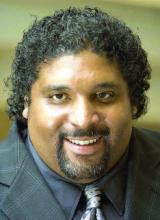
The better way says, if we follow God’s religious values we can use global technology, green economy, and targeted economic and infrastructure investment, total access to education, and creative job creation strategies to address the ugly realities of poverty. If we follow the enduring ethic of love we can beat our swords of racism into the plows that will till the new soil of brotherhood and sisterhood
If we see the poor as our neighbors, if we remember we are our brother’s keeper, then we shall put the poor, rather than the wealthy, at the center of our agenda.
If we hold on to God’s values, the sick shall have good health care. The environment shall be protected. The injustices of our judicial systems shall be made just. We shall respect the dignity of all people. We can love all people. We can see all people as God’s creations.
We can use our resources to develop our minds and economy, rather than build bombs, missiles, and weapons of human destruction.
Do we want to keep pressing toward God’s vision? Values are once again the question of our times.
Do we want a just, wholesome society, or do we want to go backwards? This is the question before us. And I believe that at this festival there is still somebody who wants what God wants. Somebody who understands there are some things with God that never change
There are still some prophetic people that have not bowed, who as a matter of faith know that Love is better than hate. Hope is better than despair. Community is better than division.
Peace is better than war. Good of the whole is better than whims of a few. God wants everybody — red, yellow, black, brown and white taken care of. God wants true community, more togetherness … not more separateness. God wants justice, always has, always will.
Because with God some things never change.

For me, intellectual exploration was one of the primary ways I connect with God. My writing, teaching, and graduate studies have not come out of a desire to attain a “deeper” faith, but rather out of a unique conviction that I must pursue these things out of faithfulness to the faith I ascribe to. God has created me for this stuff and it is a significant way I hope to edify the Church global.
Now, while this is an important reality to acknowledge and foster as I come to better understand my wiring and its relation to my Kingdom contribution, I have to hold this reality in tension with some recent experiences and convictions that have come about as a result.
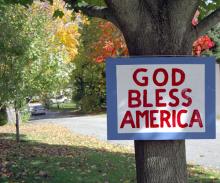
While liberals aren't as guilty of showmanship as conservatives (Keith Olbermann is the exception), they are as guilty of not taking politics seriously. Conservatives often resort to name-calling in the absence of debate, but liberals ignore whole categories of discussion. Like patriotism and religion. I suspect the reason is discomfort with talking about them, and I suspect that that's partly because they don't want to risk sounding like conservatives.
Well, it's time we got over that.
A fascinating opinion piece by Thomas Edsall on The New York Times' Campaigns Stops blog:
Is capitalism compatible with Christian values? By two to one, 53-26, Democrats believe that capitalism and Christianity are not compatible. Republicans, in contrast, believe there is no conflict, by a 46-37 margin. Tea Party supporters are even more adamant, believing that capitalism and Christian values are compatible by a 56-35 margin.
Read the full piece here

The Vatican has published rules to evaluate the authenticity of the dozens of apparitions of the Virgin Mary reported each year.
The “Norms Regarding the Manner of Proceeding in the Discernment of Presumed Apparitions or Revelations” have been in use since 1978, but until now had been available only in Latin, never officially published and only circulated among bishops and specialists.
The Vatican document has now been translated into English and other languages to aid bishops in the “difficult task of discerning presumed apparitions, revelations, messages or ... extraordinary phenomena of presumed supernatural origin,” Cardinal William Levada, the head of the Vatican doctrinal office, wrote in a companion letter last December that was published only recently on the Vatican website.
This week is one of those weeks where everyone seems to be talking, tweeting and blogging about the same video. I received it from several concerned friends with commentary like, “More bad news from North Carolina,” or “How can a loving God hate so much?” The video, which has quickly gone viral in the past 24 hours, is a clip from a recent sermon by Pastor Charles L. Worley of Providence Road Baptist Church in Maiden, North Carolina.
Following President Obama’s endorsement of same-sex marriage, pastor Worley took to the pulpit to rage against the issue of “queers and homosexuals”. However, it is his proposed “solution” to the “problem” (eerily reminiscent of Hitler’s “Final Solution”) that has the blogosphere abuzz (read: up in arms).
Worley proudly pronounces that he has found a way to get rid of all of the “lesbians and queers”: lock them all inside a fenced-off area and simply wait for them to die out on account of their inability to reproduce. In the video, his pronouncement garnered several hearty “Amens” from the congregation.
Unfortunately, this explosive video is just the most recent in a long stream of gay-marriage-related stories making headlines from my home state of North Carolina. After all, mine is the state that just passed the draconian amendment to its constitution, commonly known as “Amendment One”, banning same-sex marriage and all domestic and civil unions (never mind the fact that same-sex marriage is already illegal in our state). It seems that a day does not go by where I don’t hear a quote or read an article where another pastor has taken to the pulpit to remind his congregation that “homosexuality is wrong and against the Bible!”
This breaks my heart.
No matter where you stand on the issue of gay marriage, there are some boundaries of human decency that should never be crossed.
Never.
Even in the name of free speech, some boundaries should never be crossed. Pastor Terry Jones crossed that line in burning the Koran and making a global media spectacle. Pastor Wiley Drake crossed that line in suggesting that he was praying for the death of President Obama. And then, of course, there are the folks of Westboro Baptist Church.
But this…?!#@
Wow, this takes the prize for the most idiotic, insane, stupid, asinine, cruel, ungodly, foul, inexcusable, heinous, and disgusting comments by any person – let alone someone that calls himself a pastor and shepherd.
Yes, kids, it’s that time again already. Seems it was only seven days ago when we posted our last batch of weekly church sign epic fails, and here we are again.
So let’s get to it: your weekly infusion of bad church signs.
Now that's my kinda Jesus (except you'd think the Messiah would go Microbrew, yes?)

I hear people “brag” on a fairly regular basis about how little sleep they get, how many hours on end they work or how poorly they eat because of the demands of their schedules. Sorry, but this is not something to be proud of; it’s a sickness.
It’s no wonder, then, that on the rare occasion we actually slow down long enough to pray, worship, reflect or simply be in the moment, we have no idea how to do it. I watch people in church, and it’s clear from the body language that we don’t know how to slow down. I had a friend back in Texas who was so bad about overworking himself that he’d get sick every single time he took a vacation.
Some might argue this is a case for not taking time off in the first place, but that’s ignorant. Just because we can hold off the effects of frantic, disembodied living by pushing harder doesn’t mean we ever outrun the consequences.
Taken further, I think that such living is un-Biblical.
The sign outside the polling station at Devon Park United Methodist Church exemplified this state's struggle with a constitutional amendment to ban same-sex marriage.
"A true marriage is male and female and God," the church marquee read. All around the church sign were small campaign signs that read: "Vote Against Constitutional Amendment" and "Amendment One Harms Children Vote Against."
The amendment was approved Tuesday (May 8) by 61 percent of voters, with some counties endorsing it with more than 80 percent of the vote. Only seven counties voted against it.
"In some sense North Carolinians are voting against their own beliefs," according to the Raleigh-based Public Policy Polling firm said. "Fifty-three percent of voters in the state support either gay marriage or civil unions, yet a majority also support the amendment that would ban both."
RALEIGH, N.C. -- With only a few days remaining before North Carolinians vote on a state constitutional amendment to ban same-sex marriage, the Rev. Earl C. Johnson took five minutes on Sunday (April 30) to give congregants 10 reasons to vote against the measure.
It was his only concerted effort to wade into a subject considered taboo in most African-American churches: homosexuality. Not wanting to risk his job as senior pastor of Martin Street Baptist Church, or upset his many older congregants, Johnson figured the best approach was to stick to the facts.
The state already forbids gay marriage, he told church members. The state's top Democrats, including the governor, oppose the measure. The constitutional amendment might strip unmarried heterosexual women of domestic violence protections.
None of the points he outlined touched on the central issue: how the church might respond to gays and lesbians.
"It's a traditional church," said Johnson. "When you get to be a certain age you don't budge on your point of view. It would take years of chipping away at it to change it."
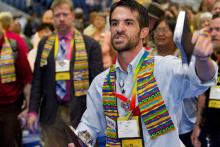
Despite emotional protests and fierce lobbying from gay rights groups, United Methodists voted on Thursday to maintain their denomination's stance that homosexuals acts are "incompatible with Christian teaching."
Two "agree to disagree" proposals were soundly defeated during separate votes by the nearly 1,000 delegates gathered for the United Methodist Church's General Conference in Tampa, Fla.
One proposal would have replaced the "incompatible" phrase in the Book of Discipline, which contains the denomination's laws and doctrines. Both proposals sought to soften the disputed doctrine by adding more ambiguous statements about homosexuality.
Gay rights advocates in the UMC viewed the compromise proposals as the best chance to advance their cause at this year's General Conference, which convenes every four years. On Friday, delegates are expected to debate the church's bans on noncelibate gay clergy and same-sex marriage.

Today, Sojourners' Communications Director Tim King talks with CNN's Lisa Desjardins about politicians and God-talk in this 2012 presidential election season.
From CNN.com:
Is Washington a holy city? It might seem that way, with all the talk about religion and morality in the 2012 election.
But all that God talk may be rubbing voters the wrong way.
"It's getting ugly out there," said Tim King, an evangelical Christian who works for the progressive religious group Sojourners. "There are a lot of Christians who are using their faith as a political weapon, which it's never meant to be."
Listen to Tim's comments on CNN Radio inside the blog.
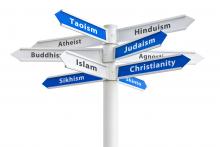
Andrew Bowen sat yoga-style in his armchair, absent-mindedly fingering a set of Muslim prayer beads in his left hand as he talked about 2011 -- his year of conversion.
But he's not Muslim. In fact, the 29-year-old Lumberton resident doesn't call himself by any of the 12 faiths he practiced for a month at a time last year.
Not Hindu (January). Not Baha'i (February). Not Zoroastrian (March). Not Jewish (April). Not Buddhist (May). Not agnostic (June). Not Mormon (July). Not Muslim (August). Not Sikh (September). Not Wiccan (October). Not Jain (November). And not Catholic (December).
Finding faith in God again was not Bowen's aim. This young father of two was looking for faith in humanity.
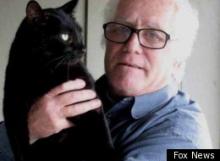
Patrick Greene, a lifelong atheist known for his public stands against Christianity, recently announced that he has become a Christian.
There are lots of ways to look at this. Some Christians may take this as validation that they were right and atheists were wrong. Some might consider it a point for the good guys. But such attitudes further the divide between people with more in common than not. Aside from that, it misses the most important point.

This is not another book that simply critiques religion. In Religion For Atheists: A Non-believer's Guide to the Uses of Religion, Alain de Botton, a noted author on a wide range of themes – from architecture to the works of Proust – examines those engaging and helpful aspects of religion (particularly focusing on Christianity, Judaism and Buddhism) that might, as he puts it, “fruitfully be applied to the problems of secular society.”
Anyone who might be offended by a work that from the outset (indeed on its very first page) asserts that “of course no religions are true in any God-given sense”, is encouraged to steer clear of this book by the author himself.
It is a book that seems to swing between revulsion of religion and the “religious colonization” that atheists are charged to reverse and a recognition that all is not well in the secular world, and that these ills may be somewhat righted by looking toward religion – let me clarify – toward those aspects of religious traditions that de Botton believes are relevant to the world today: community, kindness, education and art, for example.
The very first subject to be tackled is that of community – something that Sojourners knows a little something about (check out Nicole Higgins’ recent review of Wanderlust for some insights) – and what strikes me as interesting is that de Botton’s hypothesis on the loss of community mirrors a phrase often spoken by Sojourners CEO Jim Wallis:
Did we lose our sense of community when we began to privatize our faith?
Forty-five years ago today, the Rev. Dr. Martin Luther King delivered his now-famous speech at Riverside Church in New York City, declaring his opposition to the war in Vietnam. One year later -- 44 years ago today -- he was murdered by an assassin.
It is fitting that these anniversaries occur this year during the week we commemorate the death and celebrate the resurrection of Jesus.
Dr. King’s Riverside speech is frequently quoted, with his scathing political indictment of the war and the systems of exploitation and oppression that led to it. But how often do we remember that he began that speech by noting that while the Nobel Peace Prize was “a commission to work harder than I had ever worked before,” it was not the most important thing. He continued by saying that:
This is a calling that takes me beyond national allegiances, but even if it were not present I would yet have to live with the meaning of my commitment to the ministry of Jesus Christ. To me the relationship of this ministry to the making of peace is so obvious that I sometimes marvel at those who ask me why I'm speaking against the war. Could it be that they do not know that the good news was meant for all … Have they forgotten that my ministry is in obedience to the One who loved his enemies so fully that he died for them?
Dr. King was able to be the leader he was, take the risks he did, and ultimately make the final sacrifice, because he knew who called him and who he followed. He knew that the sacrificial death and resurrection of Jesus was a living presence in his life and gave him the hope to follow.
For him, as well as us, believing in Jesus means being a follower and a disciple in bringing the kingdom he lived and taught. By raising Jesus, by vindicating his life and death, God vindicated his message – the kingdom he proclaimed has come and will come. And because God raised Jesus from death, his living presence continues among us and we are empowered to follow him and to live the kingdom. The resurrection is the event on which our faith and hope depends.
That faith sustained Dr. King, and it can sustain us.

Holy Week and Jesus’ Ways for Peace
Palm Sunday/Passion Sunday and the week that follows — Holy Week — are times for Christians to remember and share the biblical stories of Jesus’ teachings and actions for peace. These stories encourage us to pray and work for peace, especially in light of those who are now threatening a new war with Iran. “Nine Years of War in Iraq: A Sojourners Retrospective” is a powerful reminder that churches need to do more.
Last year Sojourners posted a new hymn for Palm Sunday with peace themes, “Lord, What a Parade!” by Carolyn Winfrey Gillette.
This year the Black Mountain Presbyterian Church in North Carolina commissioned Carolyn to write a new hymn about Jesus’ nonviolent actions and compassion at the time of his arrest.

I’ve written a couple of pieces recently that have gotten a lot of attention about why younger people tend to walk away from church.
If you haven’t seen them yet, here are the links:
Seven Reasons Why Young Adults Quit Church
Four More (BIG) Reasons Why Young Adults Quit Church
Some readers suggested I might also post a piece about why young adults come back to church. Though I can’t say for sure why ALL young adults in church do so, I can share a few reasons why I, as a young adult, returned to church after an absence of ten years.

It’s been a mind-boggling fortnight at the Internet water cooler. Kony 2012. Mike Daisey’s dubious portrayal of Apple’s manufacturing practices abroad. Questions of whether the “Christian Movie Establishment” is “out to get” Blue Like Jazz … and an Amazon petition to let Rachel Held Evans use the word “vagina” in her forthcoming book, The Year of Biblical Womanhood.
Running through each of these stories and the surrounding debate are similar themes: truth, storytelling, power, persuasion. The online conversation is often vicious and acrimonious, reflecting a trend that’s spurred some writers to leave reader comments unread.
Adding to the intensity of the discussions is that almost each of these controversies involves an effort to change something: the Ugandan geo-political scene; unethical manufacturing practices; ways of talking about religious experience; “Christian” expectations for women. That’s not to say these creators set out with those ends as their foremost goal, but their projects were certainly meant to be more than beautiful or useful.
